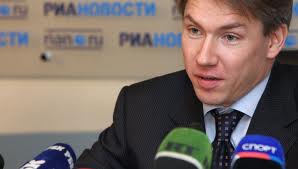By Andrew Warshaw
May 13 – Leaders of Russia’s 2018 World Cup Organising Committee have given a ringing endorsement of progress but have stayed clear of controversial subjects like racism and hooliganism.
An elaborate 76-page annual report on Russia’s preparations, released by FIFA, provides a detailed update on construction planning, stadium selection and marketing efforts.
“We have tried to reflect the main achievements for 2012 in the report; this is in line with our aim to be inclusive and transparent in our communications around preparations for the 2018 FIFA World Cup,” said Alexei Sorokin (pictured), CEO of Russia’s LOC.
“Now we are focusing on the launch of a number of important strategic projects. These include drawing up the Infrastructure Programme in cooperation with some of our key stakeholders; monitoring the design and construction of the tournament stadiums, which will be the responsibility of Arena-2018, a special agency set up by the LOC last year; and finalising the 2018 FIFA World Cup Bill, which should be ratified by the end of 2013.
“I’m sure that this solid foundation work in 2012, along with reviewing best practice from other global sports events, will help us to deliver an outstanding tournament for the world to enjoy in 2018.”
Interviewed in the report, Sorokin revealed that the Russia 2018 official emblem will be unveiled during next year’s World Cup in Brazil and stressed, not for the first time, how important the legacy aspect was.
“The key legacy message of the FIFA World Cup is to touch people,” he said. “I believe that the FIFA World Cup will attract hundreds of thousands of children and young people to play football and participate in sports, and it will bring along new social standards, will change our views of ecology, our country and ourselves. However to achieve those ambitious goals, we have to, even today, five years before the FIFA World Cup, work with the utmost dedication.”
The report, technically hugely impressive, is also, perhaps understandably, very much an exercise in self-promotion. Interviewed separately, Sports Minister Vitaly Mutko, the LOC chairman, said the 11 cities and 12 stadia chosen “draws on FIFA’s philosophy of promoting the game in the new territories and regions, as well as our intention to showcase the diversity of Russia.”
“It is important to remember that we are not hosting the FIFA World Cup only for the benefit of 11 host cities, or even the regions to which the host cities belong,” Mutko said. “The FIFA World Cup is a great event for the entire country, from Kaliningrad to Kamchatka, as well as for the world. It is a truly global event.”
On the pitch, Mutko believes Russia’s progress augurs well for 2018 though he makes it clear that organisers cannot be blamed f the team under-performs. “The LOC is responsible for organisation of the tournament. It is not our direct responsibility to prepare the national team for our country: both as tournament hosts and as a winning team, whose captain will proudly raise the FIFA World Cup Trophy aloft in 2018.”
Contact the writer of this story at moc.l1745175735labto1745175735ofdlr1745175735owedi1745175735sni@w1745175735ahsra1745175735w.wer1745175735dna1745175735

